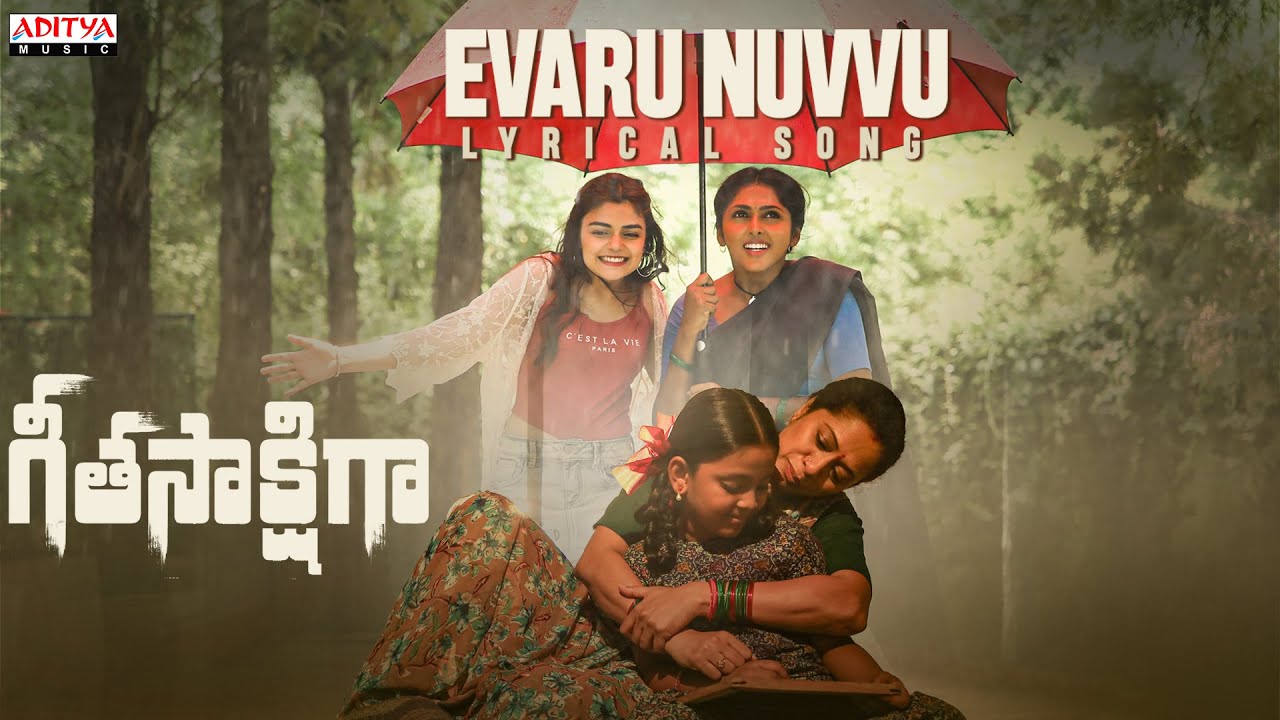This post features the Evaru Nuvvu song lyrics in Telugu and English from the Telugu movie Geeta Sakshigaa (2023). This impactful song, composed by Gopi Sundar, with lyrics by Rahman and vocals by Vijay Yesudas, addresses the serious crimes against women, like murder and rape. It questions the morality of men, reflecting on the irony of their actions: being born of women yet forgetting humanity and succumbing to violence and lust. The powerful lyrics challenge listeners to reflect on the value of life and respect for women.

| Song | Evaru Nuvvu (ఎవరు నువ్వు) |
| Movie | Geeta Sakshigaa (గీత సాక్షిగా) |
| Starring | Aadarsh, Chitra Shukla |
| Movie Director | Anthony Mattipalli |
| Music | Gopi Sundar |
| Lyrics | Rahman |
| Singer | Vijay Yesudas |
| Movie Release Date | 22 March 2023 |
| Video Link | Watch on YouTube |
Evaru Nuvvu Song Lyrics in Telugu
జరుగుతున్న ఘోరం
చరిత్ర పుటలు
తడిసి పారుతున్నా రక్త స్రావం
జగానికంత జన్మనిచ్చి పెంచు తల్లి దేహం
మృగాల చేతిలోనే
నెలకొరుగుతుంది నిత్యం
చూడు మనం వున్నా ఈ సమాజం
పిశాచాల ఓ స్మశానం లా మారే నిజం
ఎవరు ఎవరు ఎవరు
నువ్వు తెలుసా మనిషి
నెలలు మోసి కడుపు కోసి కన్నా నలుసువి
మనిషి విలువ మరిచిపోయి పశువై బలిసి
మగువ మీద మదము చూపే జన్మ దేనికీ
తానుంటే నీ ఉనికి ఉంది
లేకుంటే ఏముందిలేరా
తానుంటే నీ ఊపిరుంది
లేదంటే నువ్వేదిరా
ప్రాణాల కన్నమిన్నగా
కాస్తుంది నిన్ను కాపలా
నువ్వేమో విషపు నాగులా
కాటేసి చంపుతావిలా
నిను కనే కడుపులో
పలుగునే దించి నవ్వుతావురా
ఎవరు ఎవరు ఎవరు
నువ్వు తెలుసా మనిషి
నెలలు మోసి కడుపు కోసి కన్నా నలుసువి
మనిషి విలువ మరిచిపోయి పశువై బలిసి
మగువ మీద మదము చూపే జన్మ దేనికీ
యుగాలుగా ఈ పుడమి పైన
జరుగుతున్న ఘోరం
చరిత్ర పుటలు
తడిసి పారుతున్నా రక్తస్రావం
జగానికంత జన్మనిచ్చి
పెంచు తల్లి దేహం
మృగాల చేతిలోనే
నేలకొరుగుతుంది నిత్యం
చూడు మనం వున్నా ఈ సమాజం
పిశాచాల ఓ స్మశానం లా మారే నిజం
ఎవరు ఎవరు ఎవరు
నువ్వు తెలుసా మనిషి
నెలలు మోసి కడుపు కోసి కన్నా నలుసువి
మనిషి విలువ మరిచిపోయి పశువై బలిసి
మగువ మీద మదము చూపే జన్మ దేనికీ
Evaru Nuvvu Lyrics in English
Jaruguthunna Ghoram
Charithra Putalu Thadisi
Paaruthunna Raktha Sraavam
Jagaanikantha Janmanicchi
Penchu Thalli Dheham
Mrugaala Chethilona
Nelakoruguthundhi Nithyam
Choodu Manam Vunna
Ee Samaajam
Pisaachaala O Smashaanam Laa
Maare Nijam
Evaru Evaru Evaru
Nuvvu Thelusaa Manishi
Nelalu Mosi Kadupu Kosi
Kanna Nalusuvi
Manishi Viluva Marichipoyi
Pasuvai Balisi
Maguva Meedha Madhamu Choope
Janama Dheniki
Thaanunte Nee Vuniki Undhi
Lekunte Yemundhileraa
Thaanunte Nee Oopirundhi
Ledhante Nuvvedhiraa
Praanaala Kanna Minnagaa
Kaasthundhi Ninnu Kaapalaa
Nuvvemo Vishapu Naagulaa
Kaatesi Champuthaavilaa
Ninu Kane Kadupulo
Palugune Dhinchi Navvuthaavuraa
Evaru Evaru Evaru
Nuvvu Thelusaa Manishi
Nelalu Mosi Kadupu Kosi
Kanna Nalusuvi
Manishi Viluva Marichipoyi
Pasuvai Balisi
Maguva Meedha Madhamu Choope
Janama Dheniki
Yugaalugaa Ee Pudami Paina
Jaruguthunna Ghoram
Charithra Putalu Thadisi
Paaruthunna Raktha Sraavam
Jagaanikantha Janmanicchi
Penchu Thalli Dheham
Mrugaala Chethilona
Nelakoruguthundhi Nithyam
Choodu Manam Vunna
Ee Samaajam
Pisaachaala O Smashaanam Laa
Maare Nijam
Evaru Evaru Evaru
Nuvvu Thelusaa Manishi
Nelalu Mosi Kadupu Kosi
Kanna Nalusuvi
Manishi Viluva Marichipoyi
Pasuvai Balisi
Maguva Meedha Madhamu Choope
Janama Dheniki
Evaru Nuvvu Video Song from Geeta Sakshigaa
Song Analysis:
This song is a poignant cry against the atrocities committed against women, such as murder and rape. It is a searing indictment of societal hypocrisy and the loss of humanity in individuals who perpetuate these crimes. Through its impactful lyrics, the song forces listeners to confront the stark realities of a world where women, the very givers of life, are subjected to violence and brutality.
The lyrics trace the historical and ongoing horror of such acts, painting a grim picture of humanity’s moral decay. The line “యుగాలుగా ఈ పుడమి పైన జరుగుతున్న ఘోరం” (For ages, the horrors on this earth continue) highlights the long-standing nature of these issues, while “చరిత్ర పుటలు తడిసి పారుతున్నా రక్తస్రావం” (History’s pages are drenched with flowing blood) starkly captures the unending suffering.
The song draws attention to the irony of men forgetting the sanctity of the womb that bore them, turning into predators against the very gender that nurtures life. “నెలలు మోసి కడుపు కోసి కన్నా నలుసువి” (The flesh born of a womb that carried you for months) underscores this contradiction, calling out the loss of human values and descent into barbarity.
It challenges the audience with a series of questions: “ఎవరు, నువ్వు తెలుసా మనిషి?” (Who are you, do you know yourself as human?) These questions are a direct confrontation, forcing introspection about one’s humanity and morality. The lyrics lament the societal transformation into a “graveyard of demons,” reflecting on how communities have become complicit by ignoring or enabling these horrors.
The song emphasizes the indispensable role of women in life, both as creators and nurturers: “తానుంటే నీ ఉనికి ఉంది, లేకుంటే ఏముందిలేరా” (If she exists, you exist; without her, there is nothing). It contrasts this truth with the venomous actions of those who betray this fundamental bond, portraying them as poisonous snakes biting the very hand that sustains them.
With powerful imagery and emotional depth, the song serves as a wake-up call to recognize the sanctity of life and to foster respect and protection for women. It is a stirring appeal for humanity to rise above its failings and restore dignity and justice to all.
